Canning Peppers In Oil
Hello,
I live in a small town that has famous peppers canned in oil "Old Italians recipe". They have been doing it for years and everyone in town cans in oil. But after reading everything about canning in oil I am getting nervous as I have canned in oil as well. I have a couple of questions, the process goes like this, clean, slice and let dry, some do not let the peppers dry. Fill pot with oil, fill with peppers, bring to boil, cook until you can just barley punch with fork, prep jars and lids like normal, put in small amount of salt, fill jar with peppers, top off with oil, 1" head space. Question is by using oil that boils at 425 - 450 degrees is that enough to kill all the bad stuff. One more thing to note is a processing company has started production of the family peppers but they also add Sodium Acid Sulfate to raise ph. Last question can I do the process above but use a pressure canner and not use the Sodium Acid Sulfate?
Thanks,
Carl
Comments (38)
Linda_Lou
13 years agolast modified: 9 years agoIn one word, NO ! Not unless you want to play roulette with botulism.
carlk_pepper
Original Author13 years agolast modified: 9 years agoLinda,
Please find below something I copied about the peppers I was talking about. Also, when I talked to my wife about the warnings canning in oil she just laughs as she grew up on the same street as Branco's and her family has been canning pepper in oil for over 80 years. If you ever tasted them you will know why they do it!
Branco's Gourmet Italian peppers are unlike any that you have had. Fried and canned in oil either hot or mild they certaily are a treat. If you are going through Bellevue, Bucyrus, or Fremont while in Ohio stop in a grocery and ask for them.
Thanks again for your post. . . . but I am still confused!
Related Professionals
Simpsonville Landscape Architects & Landscape Designers · Kenmore Landscape Architects & Landscape Designers · Norton Shores Landscape Architects & Landscape Designers · Palm Springs Landscape Architects & Landscape Designers · Beverly Hills Landscape Contractors · Columbine Landscape Contractors · Danvers Landscape Contractors · Gresham Landscape Contractors · Hayward Landscape Contractors · Oak Harbor Landscape Contractors · Shaker Heights Landscape Contractors · Sun City Center Landscape Contractors · Wayland Landscape Contractors · Mounds View Roofing & Gutters · Greensboro Driveway Installation & Maintenancedigdirt2
13 years agolast modified: 9 years agoAs Linda Lou said covering peppers in oil and storing them at room temperature is not considered a safe practice as the risk of botulism is associated with it (per USDA lab testing). The testing shows that the oil insulates any botulism (and other bacteria) to such a degree that the heat is unable to penetrate and kill them.
Many home canners prefer to abide by the tested and approved canning guidelines and so avoid any associated risks. However, some do not subscribe to the guidelines and are willing to accept the associated risks. So while it certainly can't be recommended as a safe practice, it is their choice to make, their risk to take.
I also caution them to recognize that (1) commercial canning processes are very different from home canning, and (2) just because something has been done a certain way for years doesn't necessarily make it safe. It just makes them lucky. ;)
NCHFP provides directions for pressure canning peppers (no oil) and as we have often discussed here before, using Pickle Crisp when doing it will result in a better, more firm products.
UC Davis Extension offers one approved method (linked below) for marinated peppers that use a small amount of oil:
MARINATED PEPPERS
Makes 9 half-pint (250-ml) jars.
4 lb firm peppers 1.8 kg
1⁄2 cup chopped onions 125 ml
1 tbsp dried oregano leaves 15 ml
1 cup bottled lemon juice 250 ml
2 cups vinegar (5%) 500 ml
2 tbsp prepared horseradish (optional) 30 ml
2�3 cloves garlic, quartered (optional) 2�3
1 cup olive or salad oil 250 ml
1. Select and wash your favorite sweet bell or hot peppers.
2. Small peppers can be left whole but should be flattened. Large peppers should
be quartered. Slash 2 to 4 slits in each pepper. Peel tough-skinned peppers by
first heating in a gas flame, on the barbecue, or under the broiler until the skins
separate from the flesh. Then place peppers in a bowl and cover for 5 to 10 minutes.
Skins will slip off easily. Blanch other peppers for 3 minutes in boiling
water.
3. Mix onions, oregano, lemon juice, vinegar, and horseradish in a saucepan and
heat to boiling.
4. Place 1⁄4 garlic clove in each half-pint (250-ml) jar or 1⁄2 clove in each 1-pint
(500-ml) jar.
5. If desired, add 1⁄4 teaspoon (1 ml) salt to each half-pint (250-ml) jar; 1⁄2 teaspoon
(2 ml) to each 1-pint (500-ml) jar.
6. Fill jars with peppers to 1⁄2 inch (1 cm) from the top.
7. Place 2 tablespoons (30 ml) of oil in each jar.
8. Pour hot, well-mixed, vinegar solution over peppers, leaving 1⁄2 inch (1 cm) of
headspace.
9. Remove air bubbles by running a plastic knife or spatula between the food and
the jar. Then wipe jar rims with a clean, damp cloth and secure lids and ring
bands.
10. Process in a boiling water bath as prescribed in Table 5. (15 mins. up to 1000 ft.)You might consider it as a safe alternative.
Otherwise, I've learned that trying to convince someone like your wife who subscribes to the "done it this way for years and no one has died yet" philosophy is seldom convinced to change by any information we can provide here, much less all the info on the net. So ultimately the choice to do it or not is yours to make.
Hope this helps.
Dave
Here is a link that might be useful: Preserving Peppers
readinglady
13 years agolast modified: 9 years agoYou can buy tickets all your life and never win the lottery. That's bad luck. You can preserve peppers in oil for 80 years and never get botulism. That's good luck.
But all that means is so far you came out ahead. It doesn't mean the process is risk-free.
There are a lot of reasons why someone might follow a particular method of food preservation and escape any negative consequences. Botulism is rare and the statistical odds of any one small group of people (your family, friends, acquaintances) getting it is slim.
The problem is if you or someone you know does succumb, the consequences can be terrible.
But no one here is telling you or your wife what to do. If you like to gamble, feel free.
Sodium Acid Sulfate is a relatively new acidifier in the food processing industry. It's used to bring the pH down, not up. Lower pH is more acid. Botulism doesn't like acidity, so it improves safety. Commercial foods bottled in oil are commonly acidified but you need testing facilities to determine the degree of acidification required.
Boiling the oil probably drives off some of the water, which inhibits the botulism spores slightly, but it doesn't kill the botulism spores themselves. Not only that, but if the peppers in oil are eaten as a salad (cold), the risk increases.
Carol
zabby17
13 years agolast modified: 9 years agoCarlK,
Man, those do sound good!
And it's understandable why, in a town where everyone has been canning peppers this way for 80 years, people would be dubious that it could be dangerous!
Is it? It all depends on what you mean by "dangerous." The risk is of botulism. Vegetables in oil, in a vacuum at room temperature, provide a home where botulism can grow.
Now, that will only happen if the boutlism bacterium is there to begin with. And, luckily, it's pretty rare. But the reason the USDA's recommendations are most definitely NOT to preserve in oil is that, if you DO contract botulism, it's very, very serious. Often fatal.
Now, I don't know anything about that sodium acid sulfate. Maybe Linda Lou has some details about it. If a company has started selling these commercially, hopefully they have researched the local food safety regulations and are following them. Are they using just ordinary home water bath canning? There are things you can buy commercially canned in oil that are safe but they use processes and ingredients most of us don't have access to.
Now, if it were me, I might try draining those peppers and freezing them.
What variety of pepper do you use? And how do you eat them?
Sounds yummy....
Zabby
carlk_pepper
Original Author13 years agolast modified: 9 years agoEveryone,
First, I would like to thank everyone one for all your excellent information. I am very new to this canning business and I am trying to do it safely.
I have to admit that I was very surprise to find out about the dangers of canning in oil. This is not just a couple of families doing some canning; it is very wide spread in this area. Everyone that likes peppers eats Branco's Peppes, they are quite pricy so people make them their selves, but you should go and buy the Peppers from Branco's as they grow them and I think they have some special varity or something because you just can match the taste! "They are some kind of wax peppers, my wife could tell you.
You can buy pizza with Branco's Peppers, there was an old bar that I can remember as a kid that sold roast beef with Branco's Peppes on them. We eat them on everything and when they are in season my wife fries them in oil and keeps them in the fridge always!
Only recently have they been commercially processed so in my quest to try to match the recipe, "Because it is a subject to debate, no one really has the exact process" My wife use to help them as a child but she didn't pay much attention" AMG is wish she did! Anyway, I purchased some from the store and low and behold the only ingredients is vegetable oil and sodium acid sulfate which I am sure is only use commercially, not when they make them in their little shed. I also got some litmus paper to check the PH and I also tracked down a supplier for the sodium acid sulfate and have some for the ready.
I just don't know if I want to take the chance, they really are to die for, but I don't want that to be reality! So what temperature can you kill botulism, if I get the PH to the proper level would it then be save? Maybe I should just give up and buy the damn peppers at the store? I canned 22 jars this year, my first attempt and only have a couple left.
I really liked canning them and don't want to quit, so maybe I will get a pressure canner and do them differently, but I can tell you they won't even be close.
Thanks again,
Carl
P.S. If anyone would like some I can find out if they ship them. Google Branco's Pepper if you like.
Linda_Lou
13 years agolast modified: 9 years agoTesting your own foods is another thing that we do not suggest doing at home.
Carl, I am trained in home food preservation through my local university extension program and I teach food preservation as a profession. This is why I tend to be adamant about using safe, tested methods and recipes at home. Just even a bit off in ph level can be deadly. Sure, it is not something that happens on a daily basis, but it can happen. We had a nurse not far from here that got botulism and also gave it to her 2 small children from homecanned green beans. Then, I also personally know of someone who had to go to court when she provided safe methods, only the family did not follow them. A man died from eating the green beans in this case. My friend was not guilty, of course, since she had given proper advice.
My own step mom killed herself a couple years ago from some stew.... So, even if it doesn't happen with folks dying like flies, it does happen at times.
Just so you understand the warnings. You then can make the choice.
Remember, you have perhaps a $100 piece of equipment and commerical industries often have multimillion dollar equipment, special ingredients, etc.
Some things we just cannot safely duplicate at home.digdirt2
13 years agolast modified: 9 years agoThere is a great deal of information about botulism, its risks, its frequency, growing conditions, symptoms, pH and temperature required to kill it, etc. available on the web. The CDC is an excellent resource and I have linked another very informative article below.
For most of us it is sufficient to know that it is not a rare threat as botulinum spores are commonly found in the soil and water all around the world and the toxin they produce given the proper circumstances is lethal. For that reason alone the risk simply isn't worth it.
Add to that the fact that pH testing, even if it was possible to do it accurately at home, isn't all that relevant to the issue as it doesn't remain stable over time in storage. Plus the heat required to kill the spores (240 degrees) can also render some foods unpalatable, even inedible.
Those facts aren't enough for some folks. That is their choice but they are on their own when it comes to how-to do it.
There is essentially no information available on the web about this particular brand of peppers. No website, no info on how they are processed or even if they are, nothing but a name and address.
I would assume that if this "company" is selling to the public then they have to be meeting the FDA/USDA inspections/rules. If so then why not give them a call and find how they are doing that? Ask for a tour? Let them show you how and why it simply isn't possible to do it safely in the home kitchen.
If they refuse then I'd contact one of the many other commercial pepper canning companies and seek information from them.
Otherwise your only option is to do this and hope your luck holds or use one of the approved canning recipes for the peppers if you want shelf storage.
Dave
Here is a link that might be useful: CO State Extension - Botulism
John__ShowMe__USA
13 years agolast modified: 9 years agoDave writes: > Add to that the fact that pH testing, even if it was possible to do it accurately at home, isn't all that relevant to the issue as it doesn't remain stable over time in storage.
Took a few seconds for that to sink in. I think it is possible to test accurately at home (not with litmus paper), but the stability issue is something I hadn't been much concerned about until now.
I'm a Linda Lou convert. For a few years here I thought she was too "nit picky". Now I completely trust her advice.
carlk_pepper
Original Author13 years agolast modified: 9 years agoOnce again I would like to thank everyone,
I guess my short canning stint is over. If everyone can understand I am having a hard time wrapping my head around the fact that there is no save way to can peppers in oil "at home". I would have to estimate that over a million jars of peppers have been canned oil, at home, and not one person in my 51 years ever got sick let alone died. So the dangers of botulisms though rare should have reared its ugly head at some point and time.
I also am not ignorant and I hear everything you are saying and I don't want to be the person that causes anyone to become ill or even worse dead. I will simple buy them in the store!
Thanks again,
Carl
digdirt2
13 years agolast modified: 9 years agoI guess my short canning stint is over.
Was that the only thing you were interested in canning? Have you ruled out trying any of the approved recipes? Granted they don't use straight oil but that doesn't mean they aren't any good. ;)
Dave
User
13 years agolast modified: 9 years agoHi Carl,
Great to see you took my suggestion to query the folks here on the Harvest Forum regarding canning peppers in oil. I knew the good people here would provide authoritative advice in a friendly manner. You may not realize it but you garnered input from "the" seasoned members of this Forum. Trust me, you got expert advice!
I personally know that it can be disappointing when you want to preserve something because it taste so good only to find out that you can't do it safely. As has been said, it is ultimately up to you and your comfort/gambler level. For me, if there is a 1 in x to the power of a billion chance of poisoning myself or anyone else, I pass. Hey, it may never happen, great, you beat the odds. If it does happen, well, not so great.
Once something improbable happens, in that situation there is a 100% chance of it happening. Just for fun, here is a link (below) to a Canadian commercial underscoring the reality of a 1 in ? chance of something happening becoming 100% Still makes me laugh when I see it.
Bill
Here is a link that might be useful: youtube link to commercial
User
13 years agolast modified: 9 years agoCarl,
There are loads of other safe canning recipes like Dave said (for peppers and lots of other good stuff).
Hey, start with Habanero Gold jelly or Annie's Salsa... you'll be hooked on harvesting and preserving and expanding your horizons beyond a single store bought product.
carlk_pepper
Original Author13 years agolast modified: 9 years agoOk, once again I would like to thank everyone,
Yes, I am sure that there are plenty of great SAFE recipes for canning banana peppers. I have plenty of time to search the web, get a good canning book and Dave's recipe sounds good. But one thing I will do is post it here first for the thumbs up.
Has anyone here canned banana peppers, if so could you give me the recipe? The funny thing is I have never heard of anyone not canning in oil and I am sure glad I took the effort to do the research!
Thanks again,
Carl
readinglady
13 years agolast modified: 9 years agoCarl, no one thinks you're ignorant. Ignorance is a result of wilful blindness.
I'm not a statistician, but from a statistical perspective, no matter how many peppers you canned at home and how many people ate them, that's still a pretty limited sample. As has been mentioned, full-blown botulism is generally rare.
Go back to the lottery example. Assume you and everyone you know regularly buys lottery tickets. And yet, after years of purchases, no one has won the jackpot. Does that mean it won't happen? No. Probability doesn't work that way.
Keep in mind that botulism is a potent nerve toxin. So while the frequency of occurence is low, the risk is high.
It only takes one little thing. For generations native Alaskans fermented fish heads in holes in the ground lined with woven grass. Sometimes someone got sick, but not often enough to prohibit consumption of this traditional food. Then plastic containers (think Tupperware) came along and natives decided those were much more convenient.
The incidence of botulism went way way up. It only takes one little change or one little error to set up conditions much more hospitable to the formation of toxins. In other words, the botulism spores may be in a lot of those peppers but for whatever reason, they didn't produce the poison. But one day something's different - the water content, the amount of air, the type of pepper, the pH. Who knows? And then you end up with a serious problem.
I might speculate that NOT canning the peppers - i.e. heating the oil, packing the peppers in the jars, pouring over the oil and slapping the lid on may be LESS risky than canning because it's a weak seal and air still gets in. Botulism doesn't like oxygen.
But that's purely speculation. It's definitely not a recommendation.
It's pretty clear that the company you mentioned was unable to sell their peppers commercially without acidification. The FDA gets very sticky about that stuff. I worked in a cannery when I was in college. When a batch didn't meet the standard it all was thrown out. Hundreds of pounds of food discarded at one time. But that's what you have to do when you're a commercial enterprise.
I'm sorry you're discouraged. I hope you stick around and maybe try some other options for preservation. And maybe enjoy your own peppers prepared this way but as a fresh or frozen food, not a bottled one. These peppers in oil would freeze very well and would taste considerably better than any canned version.
Carol
digdirt2
13 years agolast modified: 9 years agoHas anyone here canned banana peppers
Heavens yes! Many of us do and I linked some discussions about them below that you might want to read through.
Personally I do quarts of banana peppers, mixed sweet and hots, and chili peppers every year. We do some of them whole, some sliced, some roasted and some not, and some pickled.
I have used the recipe listed above several times with excellent results and we also use several of the recipes in the Ball Blue Book (it has some 15 or so different recipes for canning peppers. NCHFP also provides the basic instructions for Canning Peppers, Pickled Peppers, and Marinated Peppers
Dave
Here is a link that might be useful: Canning peppers discussions and recipes
zabby17
13 years agolast modified: 9 years agoCarl,
Have you tried freezing the peppers? I would think about giving that a try. (But then, I have a new Foodsaver machine that vacuum packs things for the freezer so now I want to freeze everything!)Linda Lou,
Do you know anything about what temperature it would take to completely kill botulism spores? I am not recommending Carl water-bath can peppers in oil. But I am intrigued that the frying in oil goes to so much higher of a temperature --- he says 450 degrees, right, Carl? I wonder if that might be more safe than things cooked in liquid that has only part oil. (Again, not recommending canning these peppers! Just wondering about the chemistry of it. I haven't read anything about what happens in a complete oil environment at that level of heat.)Z
carlk_pepper
Original Author13 years agolast modified: 9 years agoZ,
That was my hopes, cooking the peppers in boiling oil would be hot enough to kill the botulism. My thought process was that you can use a pressure cooker to get the temperature up to 240 and kill them so in oil at over 400 should be a shoe in, I was going to get a pressure cooker just to give them an additional blast? But what I am hearing that is not the case, it is the oil that is the culprit! They must be one tough mothers and living with no oxygen . . . alien like! Scares the crap out of me!
Now, freezing . . . that is how my wife has been doing them for years, until I got the canning bug! You know you combine tools "Pressure Canner" science "Sea Level, pressure, temperature" and I�m in there! LOL
Carol said something about freezing them in oil . . . now that has my attention, how is that process?
Carl
zabby17
13 years agolast modified: 9 years agoCarl,
It seems that it's the botulism TOXIN that is so dangerous, and is produced by the botulism bacterium in those non-oxygen conditions (so a wee bit of it on your peppers you'd never notice if you ate them raw, but can them and seal them up in airtight jar and they are in their happy place and start churning out the nasty toxins like you wouldn't believe---as you say, that's a creepy little critter, liking it where there is no oxygen).
But even pressure canning and low pH doesn't kill *everything.*
Now, there's a process in Ellie Topp's book of small-batch preserving for making flavoured oils in which you heat them in a can in the oven with peppers or whatever in them, I think to 350 degrees, but then you *strain the vegetables out* and store the flavoured oil in the fridge. So even when it's been heated to that temp, it seems like leaving veggies in oil is setting up the conditions for Mr. botulism.
But oh, I hear you about the canning bug! (Mind you, if you get a Foodsaver, you might get the freezing bug, too. It's a wicked cook machine. Watch it such the air right out of a package!)
You can can the pizza sauce for the hot pepper pizza... a fiery salsa... some folks here make "cowboy candy," which is hot peppers in a sweet pickly....
Best wishes with it,
Z
gardendawgie
13 years agolast modified: 9 years agocarlk_pepper
I can not contact you privately because your email is not available. My email is available so please email to me so we can talk.
I would love to get some seeds of these peppers and grow them next year and work on pickling them or bottleing them up.
Thank You and please help me get the seeds. those peppers are full of seeds.
Garden Dawgie
carlk_pepper
Original Author13 years agolast modified: 9 years agoGarden Dawgie,
Sorry, I have not been on for awhile. Yes, I will give you my e-mail and maybe I will send you some of the peppers canned in oil from the store too? But I will warn you, after you taste them you will be hooked.
Carl
ABC1ABC1
12 years agolast modified: 9 years agoRegarding an earlier post that stated "Some things we just cannot safely duplicate at home", I ask the experts what process are the commercial canners using for "canning peppers in oil", specifically the numerous Giardiniera products packed in oil with, according to food label placement, a lessor amount of vinegar than oil. Simply asked, what is the commercial process and why can't home canners duplicate it?
digdirt2
12 years agolast modified: 9 years agoSimply asked, what is the commercial process and why can't home canners duplicate it?
In part, chemical washing solutions followed by irradiation of the foods before processing to sharply reduce bacterial counts. That's followed by high pressure autoclave processing (vs. a home pressure canner), and/or high pressure vacuum sealing.
Specific to the peppers, CO2 and/or O2 infused oils can also increase shelf storage safety but the equipment is expensive and commercial only.
Then there is the type and amount of dehydration issue. While home equipment can achieve the same level of dryness it can't do it nearly as quickly which allows for bacteria to grow during the process.
Discovery Science Channel has a great series called "How It's Made" that covers many different commercial food processing methods and how they differ from home processing.
Dave
ABC1ABC1
12 years agolast modified: 9 years agoThanks Dave, Very helpful.
On another topic, I think I'm correct that this thread has been strictly about canning peppers in oil. Would the many cautions also apply to canning "pickled" peppers in oil, i.e. marinated pickled peppers? I'm suggesting a process that holds chopped garden vegetables in a salt/vinegar brine, held for a number of weeks in refrigeration, followed by pressure canning in oil? There's pleny of recipes for canning marinated pickled peppers, but they're all based on vinegar, salt and only a small ratio of oil per jar. Alternatively, many recipes are a refrigerated process, good for 3 weeks. So again, in short, would pressure canning pickled peppers in oil result in the same cautions as provided in this thread so far?
ABC
Linda_Lou
12 years agolast modified: 9 years agoSorry, but that would not work. You still need all the vinegar and pressure canning them would make them mush.
Not sure how smart it is to pressure can oil, anyway.digdirt2
12 years agolast modified: 9 years agowould pressure canning pickled peppers in oil result in the same cautions as provided in this thread so far
Yeah. Problem is the oil coats and insulates any bacteria and prevents the heat, even pressure canned heat, from penetrating enough to kill the bacteria. Plus makes the peppers mushy.
Now if we had some way to flash process them in seconds at say 450+ degrees we could kill the bacteria AND keep them firm. But it just isn't possible at home.
So have you checked out the recipe from UC Davis Extension posted above as well as all the recipe links from NCHFP?
Consider canning the peppers plain per the instructions with Pickle Crisp added to keep them crisp. Then, after opening a jar of them replace some of the liquid with your hot oil and keep the jar in the fridge. Possible?
Dave
ABC1ABC1
12 years agolast modified: 9 years agoRight - let me break my question down one more step. Forget the canning part for a moment. Dave - you're right; One objective is to kill all bacteria before oil canning is even possible. Commercial packing has exactely the same goal, yes? So now my question is whether soaking peppers in a refrigerated vinegar/salt brine solution for a period of weeks kills the bacteria?
Thanks again - ABC
digdirt2
12 years agolast modified: 9 years agoSo now my question is whether soaking peppers in a refrigerated vinegar/salt brine solution for a period of weeks kills the bacteria?
Maybe some, not all. Listeria for one can grow in a refrigerated vinegar brine. Same with some strains of e.coli depending on how packaged. Keep in mind that even freezing doesn't kill many bacteria, it just renders them dormant while frozen.
And definitely not Clostridium botulinum - it requires high heat under pressure or radiation to kill the spores and 212 degrees for 10 mins. to destroy just the toxin it can create.
You can always choose to qualify, even ignore the guidelines and accept the associated risks. Many do just that. It's free choice. But tread carefully around the potential trap of trying to make the ends (peppers canned in oil) justify the means. :)
Dave
Linda_Lou
12 years agolast modified: 9 years agoI guess I don't see why the marinated pepper recipe doesn't appeal to you if you want to soak them in vinegar first, then put in oil. If you use cider vinegar it doesn't taste nearly as sharp as white vinegar.
ABC1ABC1
12 years agolast modified: 9 years agoThanks again Dave. Just to be clear. I�m not a risk taker and don�t plan any such thing. I�m seeking education. I tilt more to the educational journey than just searching for an acceptable recipe.
I'm aware of and have used similar recipes as those here. They're all good, but each has its characteristics. For instance, peppers packed in vinegar with "some" oil aren�t the same as the commercial oil packed products where oil and product have mingled on the shelf. Although vinegar peppers are a shelf-stable product, out of the jar, I personally wouldn�t consider them a hot seller at the farmer�s market or a good gift for Aunt Maria. Conversely, commercially-made oil packed Giardiniera will never be as good as the fresh-made variety sold at Chicago beef sandwich shops.
Killing bacteria with minimal impact to product remains the goal. Perhaps a home-based UV treatment system is yet to be invented.
Regardless, my questions have been fully answered and I again express my thanks - ABC
mjsawyer
12 years agolast modified: 9 years agoFirst of all, Carlk is telling it straight, these peppers are canned at home and in regular oil, the cheapest vegetable oil you can find, using traditional home canning methods. He's not lying when he says that in old Italian neighborhoods, every house with "older" people has these peppers. Make a roast and a sandwich with these peppers and you'll know exactly why they all have them. Old Italian women seem to have, in my experience, a habit of never really showing how something is made, like it's their legacy, like, "those peppers Eva used to make unbelievable".
I've been on the same quest to duplicate the Italian Frying Peppers my grandma used to have. I've searched for 20 years to come up with the recipe. Branco's peppers are sort of okay, but are basically crap compared to homemade one. Barnco's used to use good oil and now they got cheap, they use preservatives and they leave the seeds in, which most people don't like. They also get bad REALLY fast once opened.
I've talked to many people, people have made attempts to make these things and nobody comes close. The peppers are cubanelle peppers and they are very mild, just like a green pepper. Many people who can't digest green peppers substitute cubanelles because the skin is easier to digest. One thing you notice right away with Italian frying peppers is that they have a little "bite", not spicy, but kind of hot. This is strange since it's a mild pepper. I've been told that nothing is added to make them hot.
In most people's attempts, the peppers stay yellowish, with few red ones in each jar, but the oil looks orange. Almost too orange to have turned orange from so few red skinned peppers in the jar. Most people's attempts yield peppers that are too stiff, unlike the "family made" ones. Someone told me that if you freeze the peppers first and then thaw them when you can them, they will soften.
I'll actually be glad to give anyone $100 that can give me a recipe that works and I'm not joking one bit. The old Italian women take their recipes and pratices to grave. My grandma used to make a thing called a falalone, I've yet to ever find anyone that even knows what I mean.
I've posted a picture of one of the last 2 jars I have left. I've been told they'll stay good for 2 years or so. There's a link to the pic below.
You can contact me at mike AT mjsawyer DOT net
And having worked in Bellevue for 5 years and selling Internet to about half the population there, I'm kind of curious who CarlK is if he's from there??? And Branco's peppers are a far cry from homemade ones!
I'd also like to know how they take a mild pepper and make them hot. The "mild" versions of Italian frying peppers even have bite.
This is Branco's business listing on Yahoo - http://local.yahoo.com/info-33246360-branco-s-gourmet-italian-fremont
I haven't made it through the entire Internet yet, but I've been using the following search phrase:
+recipe +canned +"Italian frying peppers" -stuffed
mjsawyer
12 years agolast modified: 9 years agoAnother thing about the peppers is that you rarely see red ones in the stores, but in the ones that "families" make, you see more. I was told that it's because the green ones are more prevalent and "mass produced" and that the red one's seeds aren't as available. The old Italians save the seeds and keep using them and saving them, that's why they have so many red ones. I'm sure that at a marketplace they are probably more available ones in the stores. Around here, they sold in 4 packs and are way more than green peppers for no reason at all really. Here's a pic of a bushel of cubanelles. -- http://upload.wikimedia.org/wikipedia/commons/2/26/Cubanelle_Peppers.jpg
ABC1ABC1
11 years agolast modified: 9 years agoIt's been a while, but I've returned a bit wiser for my journey. Linda Lou was correct that preparing peppers in oil requires first marinating them in vinegar but then requires a second step to replace the vinegar with oil. I had been getting hung up on suggestions of only adding a small amount of oil before canning, or pouring hot oil over the now pickled peppers. Nope, I wanted peppers in oil, period. Also confusing me was that my quest wasn't so much to home-can a whole garden of vegetables/peppers, but to duplicate the process that I imagine is being used in Chicago beef stands and to a degree the process used by turn of the century Italian cooks who are said to have harvested their garden in crocks in a salt/vinegar brine, held cool by the cellar temperatures, and then once needed in the kitchen, the vegetables would be well rinsed of salt and vinegar, and replaced with vegetable oil and consumed. My quest was simply how to create a home recipe for Giardiniera in oil.
The Chicago-beef "sangwich" style Giardiniera sold in stores is a commercially packed oil-based product however the recipes you'll mostly find on the internet are vinegar-based marinades due to the inability to home-can in oil, as discussed in this thread. Should you want to buy a representative Chicago oil-packed product as a reference, I suggest IL Primo Giardiniera. This is essentially what I've been trying to reverse-engineer http://www.eathot.com/index.html. However, the beef stands don't use commercially canned product, so what are they doing? I've also attached a representative picture of Giardiniera in use.
So, here's my conclusions for a safe Giardiniera recipe, in oil, for home cooks. First, locate the recipe for "Marinated Refrigerated Peppers" from Colorado State University, http://www.ext.colostate.edu/pubs/foodnut/09314.html/. Adjust the recipe as needed adding garlic, cauliflower, or other spices and veggies as desired. Pickled sport peppers are the traditional Chicago-beef pepper, but they're hard to source so instead you can use the smallest Serrano peppers you can find at the corner store. Combine the veggies in the vinegar solution per Co-State recipe. Marinate in the refrigerator for one week. Then, drain and rinse the vinegar solution and replace with canola oil. Return immediately to the refrigerator for one more week to mingle flavors. Finally, apply Giardiniera (and oil) to Italian beef sangwiches over a 3 week period keeping the Giardiniera refrigerated. THROW AWAY ANTHING REMAINING AFTER 3 WEEKS IN OIL!
Although canning isn't a component here, I believe this recipe balances the goals of food safety and recipe objectives and applies equally to working with peppers-only. I'd be very grateful for your further guidance on my logic and understanding of working with vegetables in oil.
max webster
7 years agoIt seems there is some bad information out there. I read above 212 to kill botulism, from memory I thought it was 242deg (212 is boiling). Some old school recipes call to dredge peppers in vinegar and then can. If you bbq or bake at 450f, the botulism in not killed? Then after you peel them, hot pack in oil using a deep fryer at 3-400f. It is still not killed? Then pressure can it. Still not good enough? THEN WHY CAN TOMATOES??? My family has hot packed tomatoes for 100 years and nobody got sick so why start the hysteria about peppers? Adding salt decreases boiling point so I can see why you should pressure can but why couldn't you just bake the jars in an oven at 350f?
digdirt2
7 years agoSome confusion here Max. First, peppers and tomatoes can't be compared because their native pH is grossly different. Acidity is one of the primary controls for spore growth and botulism toxin development so tomatoes with their acidic pH are MUCH less capable of turning toxic.
Peppers have a native pH well into the alkaline range so they lack that "natural" inhibition.
Then there is the confusion over what kills botulinum spores and what destroys botulinum toxin. The spores are all around us all the time and generally pose no threat - until they are sealed into an anaerobic, low acid environment where they then begin to multiply and excrete toxins. It is the toxin that is lethal.
240 and pressure is required to kill the spores. 212 will destroy any toxin that may have developed. 2 different goals. So no, simply cooking well before hand won't kill any spores present and those spores will survive to produce toxins if conditions permit.
Hope this clarifies.
Dave
lucillle
7 years agolast modified: 7 years agoI have a question about peppers also and it is somewhat related to this thread. I was delighted with the results of my bread and butter pickles from last year, which involved pickling plus a number of (exactly followed) spices. I'm wondering if I could pickle peppers and instead of eating them pickled, drain them, soak them briefly to get some of the vinegar taste out and then fry them in oil?
The frozen peppers are OK but I'm thinking pickled peppers might have a better texture!
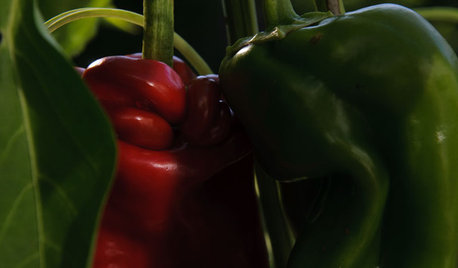

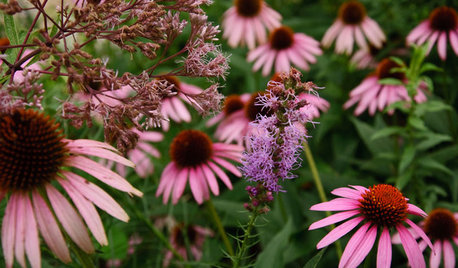



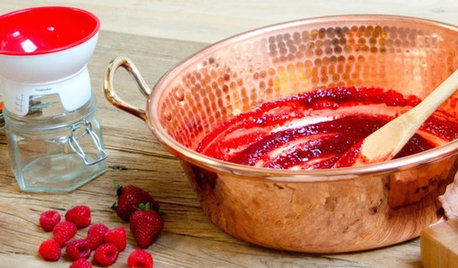
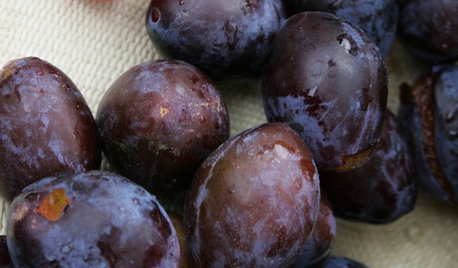
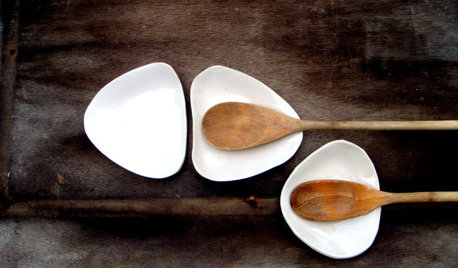








digdirt2